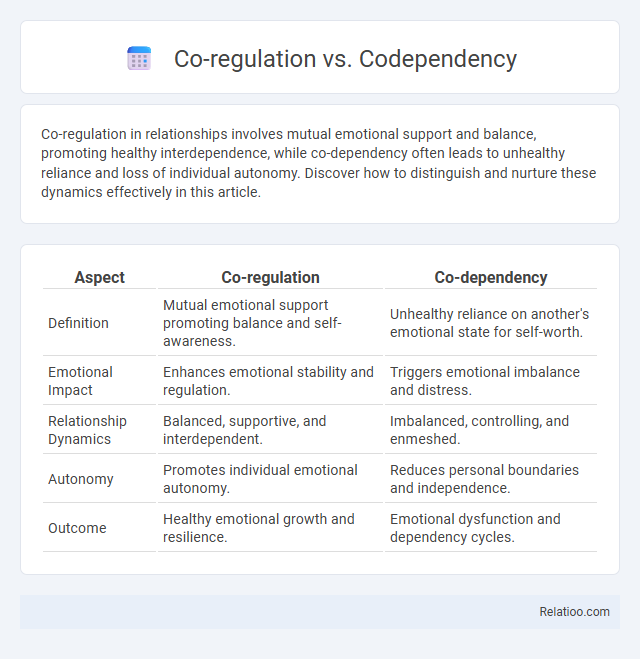Co-regulation in relationships involves mutual emotional support and balance, promoting healthy interdependence, while co-dependency often leads to unhealthy reliance and loss of individual autonomy. Discover how to distinguish and nurture these dynamics effectively in this article.
Table of Comparison
| Aspect | Co-regulation | Co-dependency |
|---|---|---|
| Definition | Mutual emotional support promoting balance and self-awareness. | Unhealthy reliance on another's emotional state for self-worth. |
| Emotional Impact | Enhances emotional stability and regulation. | Triggers emotional imbalance and distress. |
| Relationship Dynamics | Balanced, supportive, and interdependent. | Imbalanced, controlling, and enmeshed. |
| Autonomy | Promotes individual emotional autonomy. | Reduces personal boundaries and independence. |
| Outcome | Healthy emotional growth and resilience. | Emotional dysfunction and dependency cycles. |
Understanding Co-Regulation: Definition and Core Principles
Co-regulation is the process where two or more individuals mutually support each other in managing emotions, creating a balanced and safe environment essential for emotional development and relational health. Unlike co-dependency, which often involves unhealthy reliance and loss of autonomy, co-regulation promotes emotional resilience through reciprocal support and effective communication. Your ability to engage in emotional co-regulation strengthens interpersonal connections by fostering empathy, trust, and adaptive coping mechanisms.
What is Co-Dependency? Key Characteristics and Signs
Co-dependency is a dysfunctional relationship pattern where one individual excessively relies on another for emotional support and validation, often sacrificing their own needs. Key characteristics include impaired boundaries, a strong desire to control or fix others, low self-esteem, and difficulty expressing personal feelings. Signs of co-dependency involve an excessive need for approval, fear of abandonment, and a compulsive caretaking behavior that maintains unhealthy relational dynamics.
Co-Regulation vs Co-Dependency: Fundamental Differences
Co-regulation involves mutual support where both individuals help each other manage emotions in a balanced and healthy way, fostering emotional resilience and connection. Co-dependency is characterized by an unhealthy reliance where one person's sense of self-worth is tied to controlling or enabling another's behaviors, often leading to imbalance and emotional distress. Recognizing these fundamental differences can help you establish boundaries that promote healthy interactions and personal growth.
The Psychology Behind Co-Regulation
The psychology behind co-regulation involves two individuals mutually managing emotional states to achieve stability and balance, contrasting with co-dependency where one person relies excessively on another for emotional support, often leading to unhealthy attachment. Emotional co-regulation engages neural mechanisms such as mirror neurons that facilitate empathy and synchronized emotional responses, promoting resilience and interpersonal connection. Understanding these processes clarifies how co-regulation fosters adaptive social interactions, while co-dependency undermines autonomy and emotional health.
The Impact of Co-Dependency on Relationships
Co-dependency creates an imbalance in relationships by fostering excessive reliance on your partner for emotional stability and validation, often leading to unhealthy boundaries and resentment. Unlike co-regulation, which promotes mutual emotional support and healthy interaction, co-dependency can stunt personal growth and emotional independence. Emotional co-regulation enhances connection through shared emotional management, contrasting with co-dependency's tendency to enable dysfunction and hinder authentic intimacy.
Benefits of Healthy Co-Regulation
Healthy co-regulation fosters emotional stability by allowing individuals to support each other's emotional responses through attuned, reciprocal interactions, enhancing self-regulation skills and resilience. Unlike co-dependency, which often involves unhealthy reliance and boundary issues, healthy co-regulation promotes autonomy while maintaining empathetic connection. Emotional co-regulation optimizes stress management and interpersonal communication, leading to stronger relationships and improved mental health outcomes.
Common Pitfalls in Co-Regulated and Co-Dependent Dynamics
Co-regulation involves mutual support in managing emotions, while co-dependency often leads to unhealthy reliance and loss of individual boundaries. A common pitfall in co-regulated dynamics is the risk of blurred personal limits, causing emotional burnout or enabling avoidance of self-regulation. Your awareness of these nuances can help maintain balance, ensuring emotional support without fostering dependency or emotional enmeshment.
How to Foster Co-Regulation in Your Relationships
Fostering co-regulation in your relationships involves cultivating mutual emotional awareness and responsiveness, which helps partners or family members effectively manage stress and maintain stability together. Practicing active listening, expressing empathy, and developing shared coping strategies enhance emotional synchrony, distinguishing co-regulation from co-dependency where unhealthy reliance occurs. Building trust and setting healthy boundaries promote emotional co-regulation, enabling individuals to support each other's regulation without losing autonomy.
Red Flags: When Co-Regulation Becomes Co-Dependency
Co-regulation involves mutual emotional support promoting healthy self-regulation, while co-dependency is characterized by excessive emotional reliance and impaired boundaries. Red flags indicating co-regulation has shifted to co-dependency include a persistent need for approval, inability to function independently, and emotional exhaustion due to unbalanced support. Emotional co-regulation maintains balance by recognizing individual autonomy, whereas co-dependency undermines it through controlling or enabling behaviors that inhibit personal growth.
Building Resilience: Moving Beyond Co-Dependency
Co-regulation involves You and another person actively managing emotions together, fostering healthier interactions compared to co-dependency, where emotional reliance becomes excessive and detrimental. Emotional co-regulation supports building resilience by promoting mutual support without losing personal boundaries, enabling individuals to recover from stress and challenges more effectively. Moving beyond co-dependency toward co-regulation enhances emotional independence and strengthens relational well-being.

Infographic: Co-regulation vs Co-dependency
 relatioo.com
relatioo.com